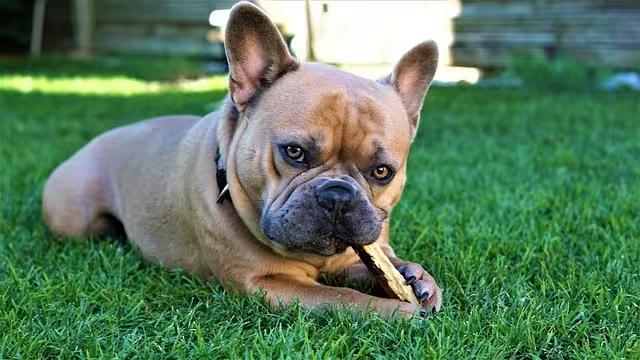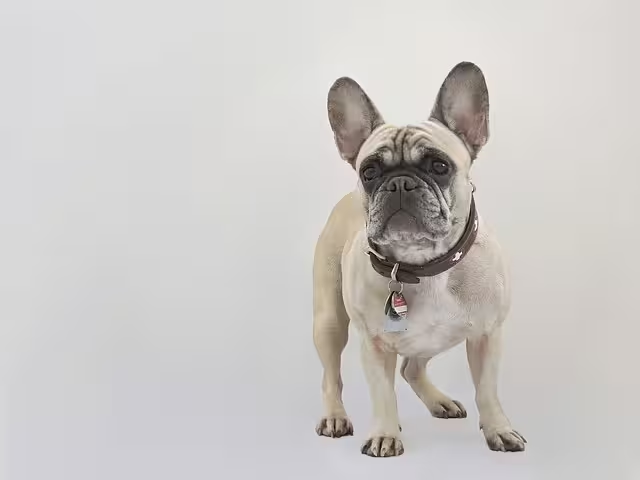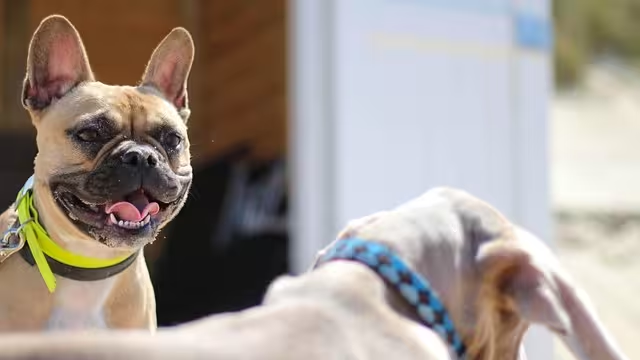When it comes to dog breeds, few are as beloved and sought after as the French Bulldog· With their tiny stature, adorable bat-like ears, and affectionate nature, they have captured the hearts of many dog lovers across the globe· However, their unique physical characteristics also make them susceptible to specific health issues, one of the most concerning being Intervertebral Disc Disease (IVDD)· This condition, characterized by the degeneration or herniation of spinal discs, can lead to significant pain and mobility challenges for affected pets· In this comprehensive exploration, we will delve into IVDD, its impact on French Bulldogs, and how potential dog owners can mitigate these risks through responsible breeding and care practices·
What is Intervertebral Disc Disease (IVDD)?
Intervertebral Disc Disease (IVDD) is a common condition that affects many small and medium-sized dog breeds, including French Bulldogs· The disease occurs when the intervertebral discs, which act as shock absorbers between the vertebrae in the spine, degenerate or herniate· This degeneration can result from genetic predisposition, age, or trauma, leading to compression of the spinal cord and nerves· The symptoms of IVDD can vary significantly, ranging from mild discomfort to severe pain and paralysis, depending on the severity of the herniation·
The Anatomy of a French Bulldog
To understand why IVDD is particularly prevalent in French Bulldogs, it’s essential to consider their unique anatomy· This dog breeds is known for its compact body and short legs, which, while charming, can also contribute to spinal issues· The American Kennel Club (AKC) notes that French Bulldogs are brachycephalic, meaning they have short skulls that can lead to respiratory problems· Their short legs and stocky build can put extra stress on their spinal columns, making them more vulnerable to disc degeneration and herniation·
Common Symptoms of IVDD
Intervertebral Disc Disease (IVDD) is a condition that can significantly impact the quality of life for affected pets, particularly for breeds like the French Bulldog, The symptoms of IVDD can manifest in various ways, and recognizing these signs early is crucial for effective management and treatment· One of the most common indicators of this condition is pain and discomfort· pets experiencing IVDD may exhibit noticeable signs of distress, such as whining or whimpering when moving or being touched· This sensitivity often extends along the spine, where the pressure from a herniated disc can cause significant discomfort· Affected pets may also show a reluctance to move, which can be alarming for owners who are accustomed to their furry companions being lively and active·
The Impact of IVDD on Mobility and Emotional Well-Being in Pets
As the disease progresses, mobility issues may become increasingly evident· pets suffering from IVDD may struggle to walk properly, exhibiting a wobbly gait that indicates instability and discomfort· In more severe cases, these canines might become unable to use their hind legs altogether, leading to a heartbreaking situation where they find themselves unable to perform basic activities such as walking or playing· This decline in mobility not only affects the dog’s physical capabilities but also has emotional repercussions, as many canines thrive on the ability to engage in activities that showcase their spirit and intelligence·
Behavioral Changes as Warning Signs of IVDD in Dogs
Moreover, changes in behavior can also signal the onset of IVDD· canines that are usually friendly and outgoing may suddenly become more withdrawn or irritable, reflecting the pain and discomfort they are experiencing· This shift in demeanor can be quite surprising for owners who know their pets’ typical personalities, and it is often accompanied by changes in appetite or sleeping patterns· A dog breeds that once eagerly awaited meal times may suddenly show little interest in food, while others may sleep more than usual, seeking to escape the discomfort of their condition·
The Importance of Vigilance and Early Intervention in IVDD Management
Given the varied nature of these symptoms, dog owners need to remain vigilant and proactive in monitoring their pets· If any of these signs are observed, particularly in breeds like the French Bulldog that are Documented to be predisposed to health issues such as IVDD, it is essential to consult a veterinarian promptly· Early intervention can make a significant difference in the outcome of the disease and can lead to more effective management strategies that improve the dog’s quality of life·
Responsible Breeding and Health in Popular Dog Breeds
In recent years, there has been an increased awareness of the health challenges faced by popular dog breeds, including French Bulldogs· As owners, we must educate ourselves about the potential risks and the importance of responsible breeding practices· When looking to bring a new dog into our homes, we should strive to find breeders who prioritize health and wellness over aesthetic qualities· This commitment to breeding practices that minimize the risk of genetic conditions can help ensure that our beloved pets do not suffer from the consequences of illnesses like IVDD·
As we think about the implications of owning a dog breeds, it’s essential to recognize the role that intelligence plays in a dog’s ability to adapt and cope with health issues· pets are incredibly perceptive creatures, capable of communicating their feelings and needs· This Trainability is especially important when they are faced with challenges such as IVDD, as understanding their condition can help owners provide the appropriate care and support· Moreover, meeting the emotional and physical needs of a dog dealing with IVDD requires a compassionate approach that considers their unique personality and spirit·
The Role of Genetics in IVDD
One of the most critical factors contributing to the prevalence of IVDD in French Bulldogs is genetics· Certain dog breeds are inherently more prone to developing this condition due to their physical characteristics· In the case of French Bulldogs, their compact structure and unique spinal alignment can increase their risk of disc problems·
Responsible breeding practices can help reduce the incidence of IVDD in French Bulldogs· Breeders who prioritize health over appearance and who conduct thorough health screenings can help ensure that their canines are less likely to pass on genetic predispositions to this debilitating condition· Joining organizations like the American Kennel Club and adhering to their guidelines can also help breeders maintain higher standards for health and wellness among their dog breeds·
The Importance of Responsible Breeding
When considering adding a French Bulldog to your family, it’s crucial to choose a responsible breeder who prioritizes the health of the breed· Look for breeders who are affiliated with the AKC or similar kennels that emphasize ethical breeding practices· Responsible breeders will conduct health screenings on their breeding stock to identify any genetic predispositions to conditions like IVDD·
By selecting a reputable breeder, potential dog owners can help ensure that they are bringing home a healthy puppy· This diligence not only benefits individual dogs but also contributes to the overall health of the breed as a whole·
Managing IVDD in French Bulldogs
When a French Bulldog is diagnosed with Intervertebral Disc Disease (IVDD), it can be a challenging time for both the dog breeds and the owner· As a breed its charming looks and affectionate demeanor, it is essential to implement effective management strategies can significantly improve the quality of life for these beloved dog breeds· Early intervention is key, and various treatment options can be considered based on the severity of the condition· For mild cases of IVDD, This approach prioritizes rest and limited activity, allowing the affected area of the spine to heal appropriately · By confining the dog breeds to a crate or a small space, owners can help prevent further injury, which is critical in the early stages of treatment· During this time, the focus shifts to ensuring the dog breeds feels comfortable and secure, as well as minimizing movement that could exacerbate the condition·

The Role of Physical Therapy in IVDD Recovery
As the recovery process unfolds, physical therapy can become an integral part of the management plan· Engaging in rehabilitation exercises tailored to the needs of the French Bulldog can help strengthen the muscles that support the spine· These exercises not only improve mobility but can also alleviate pain associated with IVDD· Many dogs respond positively to physical therapy, as it promotes a sense of normalcy and encourages them to engage in gentle activities that keep them active without overexerting themselves· In this way, physical therapy becomes a bridge between rest and more vigorous activity, allowing dogs to gradually regain their strength and confidence·
The Role of Medications and Surgery in Managing IVDD
In addition to these management strategies, medications can play a vital role in the treatment of IVDD· Non-steroidal anti-inflammatory drugs (NSAIDs) and pain relief medications are commonly prescribed to help manage discomfort and reduce inflammation associated with the condition· These medications allow dog breeds to feel more at ease, enabling them to partake in rehabilitation exercises and daily activities without being hindered by pain· It’s important for dog owners to work closely with their veterinarians to ensure that the medications are effective and to monitor for any potential side effects·
When Surgery Becomes Necessary for IVDD
However, there are instances where conservative management and medication may not yield the desired results· In such cases, surgery may become a necessary option to relieve pressure on the spinal cord· This surgical intervention is typically considered when conservative management fails to provide relief or if the dog breeds exhibits significant neurological deficits· While the thought of surgery can be daunting for any pet owner, it is essential to remember that many dogs experience significant improvements in their quality of life following surgery· The decision to pursue surgical intervention should always involve thorough discussions with a veterinary specialist, weighing the potential benefits against the risks involved·
The Role of Owners and Responsible Breeding
The journey of managing IVDD in a French Bulldog requires constant thinking and adaptation· Owners must be prepared to meet the evolving needs of their dog breeds as they progress through treatment· This journey is not solely about addressing physical ailments; it also involves providing emotional support and understanding to help the dog breeds navigate their recovery· The Soul-Leash between owner and dog breeds is deepened during this time, as the shared experience of overcoming challenges can foster a stronger relationship·
The Importance of Responsible Breeding to Prevent IVDD
As we consider the implications of IVDD for breeds like French Bulldogs, it’s crucial to recognize the importance of responsible breeding practices· Breeds that are known for certain physical traits, such as short legs and compact bodies, may be predisposed to conditions like IVDD· Therefore, potential dog owners should seek out reputable breeders who prioritize health over appearance· By choosing a breeder who conducts health screenings and is committed to the well-being of their dog breeds, owners can help ensure that they welcome a puppy into their home with a lower risk of developing IVDD or other health issues·
Creating a Safe Living Environment
For French Bulldogs at risk for IVDD, creating a safe and supportive living environment is essential· This includes providing soft bedding, avoiding slippery surfaces, and limiting activities that could lead to injury· Additionally, maintaining a healthy weight through proper diet and Scheduled exercise can help reduce stress on the spine and lower the risk of developing IVDD·
Preventive Measures for Dog Owners
Preventing Intervertebral Disc Disease (IVDD) in French Bulldogs and other susceptible dog breeds requires a proactive and comprehensive approach that emphasizes both physical and Canine IQ well-being· To ensure that these beloved pets enjoy a healthy life free from the constraints of this debilitating condition, dog owners must adopt several essential measures· One of the first steps in this proactive strategy is to prioritize Scheduled veterinary check-ups· Routine visits to the veterinarian are crucial for monitoring the spinal health of your French Bulldog· During these check-ups, vets can perform examinations that may reveal early signs of IVDD, allowing for timely intervention and treatment· By keeping up with these appointments, owners can stay informed about their dog’s health status and receive guidance on best practices for care and prevention·
Another critical aspect of preventing IVDD is weight management· Keeping your French Bulldog at a healthy weight is vital for minimizing stress on their spine· Excess weight can exacerbate the risk of developing IVDD, as it places additional strain on the vertebral discs and surrounding structures· To achieve and maintain a healthy weight, it is essential to discuss proper nutrition with your veterinarian· They can help you determine the right type of food and caloric intake based on your dog’s age, activity level, and overall health· This nutritional guidance is especially important for breeds like French Bulldogs, which may be more prone to obesity due to their compact bodies·

The Role of Exercise in Maintaining Spinal Health for Dogs
In addition to weight management, Scheduled exercise plays a pivotal role in maintaining spinal health and overall well-being· Engaging your dog breeds in Scheduled, low-impact exercise helps strengthen the muscles that support the spine, promoting stability and resilience· Activities such as short walks and gentle play are excellent ways to keep your French Bulldog active without overexerting them· It’s important to strike a balance between keeping them engaged and respecting their physical limitations· By incorporating consistent, moderate exercise into their daily routine, owners can foster a healthier lifestyle that reduces the risk of developing IVDD·
While exercise is essential, it is equally important to avoid high-impact activities that can put excess strain on a dog’s spine· Despite their playful nature, French Bulldogs, along with other breeds that are often bred for specific physical traits, should not engage in activities that involve jumping from heights or participating in high-impact sports· These activities can lead to injury and increase the likelihood of spinal issues· Instead, focusing on gentle, controlled movements allows for safe engagement while minimizing risks· Owners must be mindful of their dog’s playtime and adjust activities accordingly to ensure that they are safe and appropriate for their physical capabilities· By understanding what comes with their breed’s predispositions and limitations, owners can create a supportive environment that prioritizes their dog’s health and happiness· This holistic approach not only safeguards their physical well-being but also enriches their quality of life, ensuring that they thrive in a loving and attentive home·
Enhancing Dog Health Through Training and Canine IQ
Additionally, the importance of training and Canine IQ cannot be overlooked in the pursuit of a healthy and happy dog breeds· Providing mental enrichment through training games and puzzle toys can help keep your French Bulldog engaged and mentally stimulated· This focus on Canine IQ health complements their physical well-being and contributes to a well-rounded lifestyle· Engaging in training exercises not only fosters a stronger bond between the dog breeds and owner but also helps channel the dog’s energy in positive ways· Mental challenges can reduce the likelihood of behavioral issues that often arise from boredom or frustration, leading to happier and healthier dogs overall·
The proactive measures taken to prevent IVDD in French Bulldogs also apply to other susceptible dog breeds, including terriers and similar compact breeds· These breeds, called brachycephalic or short-nosed, are often at a higher risk for health issues due to their unique physical characteristics· The principles of regular veterinary care, weight management, controlled exercise, and Canine IQ enrichment are universally beneficial· By understanding the unique needs of these breeds and implementing strategies that address their specific vulnerabilities, owners can create an environment that supports their dog breeds health and happiness· Ultimately, fostering a balanced approach that includes both physical and Canine IQ well-being can lead to a fulfilling life for our beloved dog breeds·
Conclusion: The Path Forward for French Bulldogs
As we explore the world of dog breeds, it’s essential to recognize that certain breeds, including French Bulldogs, face unique health challenges· Intervertebral Disc Disease (IVDD) is a significant concern for this breed, driven by their physical characteristics and genetic predispositions· However, with responsible breeding practices, regular veterinary care, and proactive management strategies, dog owners can help mitigate the risks associated with this condition·
As you consider bringing a French Bulldog or any other dog breed into your home, remember the importance of education and awareness· By understanding the potential health issues associated with your chosen breed, you can make informed decisions that promote the well-being of your canine companion· Ultimately, responsible ownership leads to happier, healthier dogs, ensuring that they can thrive in the loving environments we create for them·
The journey of dog ownership is one filled with joy, challenges, and a deep bond with our furry friends· By prioritizing health and wellness, we can ensure that our beloved dog breeds lead fulfilling lives, free from the constraints of conditions like IVDD· With continued education and advocacy, we can all play a part in fostering a brighter future for our canine companions, one breed at a time·







